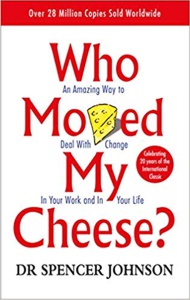
Who Moved My Cheese?
COVID-19 and Why I Keep Thinking About This Book
 Who Moved My Cheese by Dr Spencer Johnson was a best seller in 1998. It went on to sell 28 million copies. With the COVID-19 Pandemic, this 96-page book feels more relevant now than ever.
Who Moved My Cheese by Dr Spencer Johnson was a best seller in 1998. It went on to sell 28 million copies. With the COVID-19 Pandemic, this 96-page book feels more relevant now than ever.
The book tells a story about the four ways people deal with change. I remember reading the book in an hour, and it opened my eyes. I shared the book with everyone and talked about it for months. It inspired me to think differently and to learn more about constructive ways to deal with change.
This novel Coronavirus has moved all our cheese in ways that few of us imagined possible.
As we collectively face what could be a culture-changing pandemic, we are confronted with an opportunity. The opportunity to choose how to respond.
For more insights into dealing with change, I suggest looking to Jedi Master Yoda for inspiration.
Many of us grew up listening to Yoda (from Star Wars) speak of fear and attachment. He said, “You need to train yourself to let go of everything you fear to lose.” Why? Because “Fear is the path to the dark side. Fear leads to anger. Anger leads to hate. Hate leads to suffering.”
It is all too easy to focus on our fears, rather than how we might confront our problems. Focusing on our fear leads to hoarding toilet paper, ammunition and all kinds of irrational behaviours. The alternative is to focus on solutions. But how do you choose your thoughts versus reacting to your emotions?
You practice and develop your personal mastery and leadership effectiveness.
Here’s how:
- Start by recognizing your thoughts as stories you’re making up, rather than facts.
- Then bring your focus into the present or the now.
- Determine what’s real, not made up, using real facts, not opinions.
- Accept the facts. You don’t have to like them, but you do have to accept them.
- Acceptance creates an openness to explore possibilities.
- Ask yourself which possibilities are actionable in the short-term, and still align with your longer-term goals.
- Take constructive action where you can.
- Pay special attention to your communication practices. Be inclusive and enrolling.
- Then gauge your effectiveness with feedback.
- Keep repeating this process to make things workable.
This process involves mindfulness, emotional mastery, lateral thinking, creativity and no small measure of patience. Often a business or personal coach is needed to teach you the skills, and help you practice them when things are going to hell around you.
Granted, it is easier to learn these skills before a crisis, but there is no time like the present to learn. The goal is to respond as powerfully and purposefully as possible.
I know when I had my stroke and I was laying in the hospital paralyzed; I was feeling the fear and confronting life-altering change. If not for my personal mastery training, my attitude and path to recovery would have looked decidedly different. I think this Pandemic is the second greatest threat I’ve seen, due to its scale and duration. I can’t help but reflect on my stroke and the training that helped me through the experience.
As entrepreneurs, executives and business owners, our choices affect far more than ourselves. The choice before each of us is how we chose to think and act during this pandemic.
Will we get stopped by fear and turtle up, or will we master our fear and look for creative solutions that involve others?
If you have personal mastery training, you have an opportunity to lead and to help shift people from a focus on fear to something more productive like mobilising your community.
If you’re paralyzed by fear and catastrophizing thoughts, it’s a great time to learn personal and emotional mastery. These skills will help you and your business emerge from this crisis stronger than ever.
I suggest investing a little time reading. It will help you prepare for a tough road ahead. Start your reading with:
Who Moved My Cheese by Dr Spencer Johnson (for context and insight)
Out Of The Maze by Dr Spencer Johnson
Lateral Thinking: Creativity Step By Step by Dr Edward De Bono
The Mindful Leader: 7 Practices for Transformation by Michael Bunting
Emotional Intelligence: Why It Can Matter More Than IQ by Daniel Goleman
Leader Effectiveness Training: L.E.T. by Thomas Gordon
Your Brain at Work by David Rock
Life Sinks or Soars by Rael Kalley
Be Your Best by Linda Adams
The topics include: Change Management, Lateral Thinking, Mindfulness, Emotional Mastery, Leadership, Personal Effectiveness and Effective Communication. The specific books are not what’s important. Find some titles on the topics listed that resonate with you.
I’ve spent 20+ years learning this stuff and I can’t imagine what I would do now without these skills and practices.
I sincerely hope you take advantage of your at-home time to prepare yourself and your family to embrace change and to thrive in the face of adversity.


